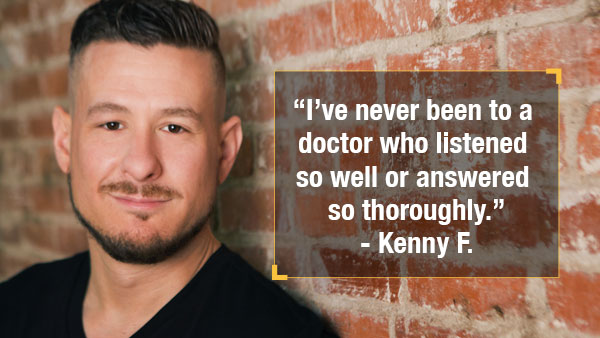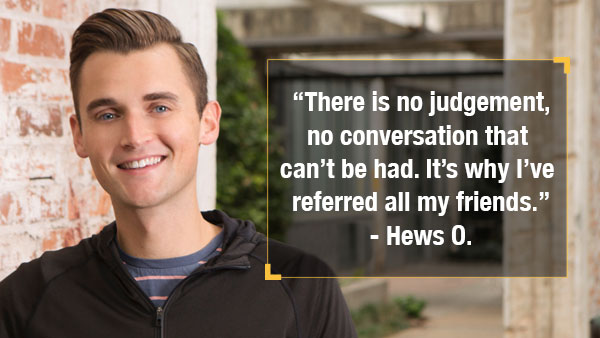Accepted Insurance



IS PreP RIGHT FOR YOU?
The best way to find out is to have an honest conversation about your sex life with a doctor you trust.

WE CAN HELP YOU DECIDE
We’ve HIV prevention and treatment specialists. We’re expertly familiar with PreP’s pros and cons.

WHY US?
As gay, board-certified physicians specializing in gay men’s health, we’ve helped thousands decide on PreP.

HOW WE HELP YOU DECIDE
We consider your sexual preferences, relationship status, and sexual activity, match it against your health status, weigh your concerns, and make a recommendation.
Here’s How Our Patients Rate Us:
More Information On PreP
Who’s The Best Candidate For PreP?
PrEP is indicated for those who have a “high-risk lifestyle.” This could be people who have sex with multiples partners or somebody in a monogamous relationship with an HIV+ partner. Not everyone needs PrEP, but everyone needs to have an honest discussion about their sexual history with their doctor in order to make the best recommendation. Have this discussion with your provider and decide if PrEP is right for you.
If you’re considering PrEP, you need to be currently HIV negative. Testing can miss a recent infection, so if you’ve had flu-like symptoms in the last month, you should tell your doctor. If you have hepatitis B, PrEP could interfere with the medications you’re taking. Make sure that your doctor has your full medical history so they can give you the best guidance.
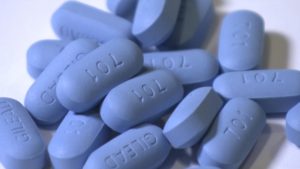
How does PrEP work?
PrEP, short for “pre-exposure prophylaxis,” is the practice of using antiretroviral drugs to prevent HIV infection. Truvada and Descovy are the brand names of the drugs given for PrEP. Truvada is made up of two drugs: Emtricitabine and tenofovir, and Descovy is made up of Emtricitabine and tenofovir alafenamide. They work specifically by blocking HIV reverse transcriptase, an enzyme that allows the virus to make more copies of itself.
How effective is PrEP at preventing HIV?
If you take it as prescribed, it can be up to 99% effective. Consistent condom use during anal sex only stops 70% of HIV infections but practically, that number is misleading as studies show only 1 in 6 gay men consistently use condoms. The CDC states that new HIV infections could be reduced by 70% through a widespread push of testing, treatment and prevention.
How long does it take for PrEP to take effect?
PrEP is a medication carried in your bloodstream. It also concentrates in other areas, specifically in rectal tissue (studies haven’t been done on other types yet, including penile or vaginal).
Studies suggest rectal tissue concentration peaks about a week after you begin taking PrEP, with other areas taking longer at twenty (20) days. PrEP isn’t like taking an aspirin for a headache, it takes time for it to reach peak effectiveness.
It takes 7 days of (consistent!) daily use to reach its max protection for those engaged in receptive anal sex. For everyone else (insertive or intravenous drug use), it takes 20 days.

If I’m using PrEP, do I still have to use condoms?
Absolutely. PrEP does NOT protect you from other STIs. And while it’s nearly 99% effective when taken as prescribed, if you don’t take it consistently your protection level drops. You should continue practicing safe sex even while taking PrEP.
What are the side effects of PrEP?
As with any medication, some may experience side effects. These include buildup of lactic acid in your blood (lactic acidosis), liver problems, diarrhea, jaundice and other issues. If you have hepatitis B, it’s possible to develop liver problems even after you stop taking PrEP. You should always discuss your concerns with your healthcare provider first.
Does PrEP protect against other STIs besides HIV?
No, PrEP provides no protection for other STIs. It’s important to continue using condoms along with taking PrEP to protect yourself as completely as possible.
Once you start using PrEP, do you have to use PrEP forever?
PrEP isn’t a vaccination, it’s a daily medication. In order to maintain its effectiveness, you’ll need to take PrEP as long as you’re engaged in high-risk behaviors. That said, if something changes (if your lifestyle is low-risk because you have no partner or are in a committed relationship), you may choose to stop taking PrEP.

Does PrEP work differently for “tops” or “bottoms”?
Like some other medications, PrEP reaches a maximum effective protection level after you begin taking it, but it’s not immediate. For receptive anal sex, max protection is reached after 7 days of daily use. For everything else (insertive anal/vaginal or intravenous drug use) it takes 20 days of daily use. Bottoms are known to be at a greater risk of infection, which means PrEP can actually provide better benefits!
How often do I have to go to the doctor when taking PrEP?
Your healthcare provider will decide how often they need to see you, based on your overall health and other factors. You’ll also need to have regular HIV testing while taking PrEP, which usually means every 3 months.
What will my doctor’s visits look like for PrEP?
Initially, your doctor may want to see you a bit more frequently after you start taking PrEP. They’ll keep an eye out for things like possible side effects. After that, you will likely start a more regular schedule that includes HIV testing. At minimum, you’ll need those every three months.
Where do you get PrEP?
If you’re insured, you can ask your healthcare provider. While you don’t need to see an HIV specialist to get a prescription, not all providers are familiar with PrEP though. There are online resources that can also help, including PleasePrepMe.org. They’ll answer questions and even help you find insurance plans or other options.
Availability and pricing
Many insurance programs cover PrEP, including Medicare/Medicaid. Your cost varies based on your coverage. You may have a copay, an annual cap or both. PrEP is widely available in the US.
If you’re not sure if your provider carries or covers it, this PrEP finder can help. Through the Gilead Advancing Access program, you can also get assistance with your copay, or additional help if you’re uninsured.
Is PrEP covered by my insurance?
Most insurance plans cover PrEP, including Medicaid, though your copay will vary. There may also be prior authorization required (in some cases, a negative HIV test), so you’ll need to work with your healthcare provider to determine the steps you need to take to make sure you’re covered. Gilead, the makers of Truvada and Descovy, offer financial assistance plans that can help with your copay, too.
How much does Truvada and Descovy cost with insurance?
With insurance, your cost is dictated by your copay, just like any other prescription medication. Some may charge a percentage or use a tiered system instead.
The Gilead Advancing Access program can help, even with your copay! Here’s a detailed guide on coverage and how to navigate the process.
How much does Truvada and Descovy cost without insurance?
Without insurance, it can cost between $1500-$1900/month, but the good news is that there are plans and programs that can help. If you’re uninsured and think that PrEP might be the right choice for your lifestyle, make sure you explore all your options for getting help with the cost.
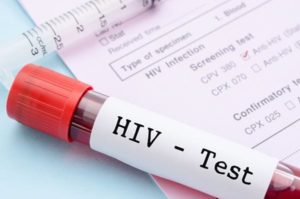
I’ve heard about taking a pill for 28 days after you’ve been exposed to HIV (“PEP” or post-exposure prophylaxis). Are PEP and PrEP the same?
PEP stands for Post- Exposure Prophylaxis, while PrEP is Pre-Exposure Prophylaxis. That means you take PrEP if you’ve tested negative for HIV and before you have any exposure, including high-risk sex or intravenous drug use. If you’ve been recently exposed, that’s when you take PEP (and continue taking it for 28 days).
“Recently” means no more than 72 hours, so if you think you have been exposed, it’s important to see your healthcare provider immediately.
What happens if I contract HIV while taking PrEP?
If you become infected while taking PrEP you need to tell your doctor immediately. Taking PreP if you’re HIV positive can make it harder to treat over time.
I have a friend who has HIV and he/she is taking PreP; can I just use his/her meds for PrEP? Can we share meds?
You should never share prescription meds.
What happens if access to PrEP is interrupted? What if I stop taking PrEP and then start taking it again later?
You can always stop taking PrEP and start again later. While you’re not taking it, you won’t have any protection, though. And when you decide to start again, you’ll have to go through the same testing process again to ensure that you’re still HIV negative.
If I stop taking PrEP, will I be more likely to contract HIV than I was before it started?
No, stopping won’t change the likelihood of you contracting HIV later.
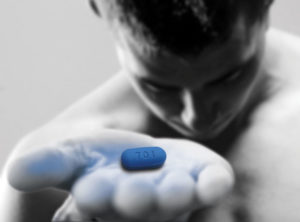
What happens if I accidentally miss a dose of PrEP?
The highest levels of protection are only when you take it consistently. If you miss a dose, it doesn’t just disappear from your body, but you could experience a dip in effectiveness. Looking at the iPrex study, the difference in 7 pills per week and 4 was about a 3% reduction. If you only took 2 pills in a week, your protection rate would drop a whopping 20% (to 76%). Yes, that’s like saying 3 out of 4 times you won’t become infected. But is that a chance you really want to take?
If I missed a dose yesterday, is it okay to take two pills on the same day?
It depends. If you normally take it at breakfast and remember at dinner you forgot, then yes, go ahead and take your missed dose. But if it’s already time to take the new day’s dose, don’t take two.
What can I do to remind myself to take PreP every day?
We’re human and we’re sometimes bad at following routines, especially with taking medications. Setting up reminders is one of the best ways to fix that. Put it next to your toothbrush so you take it when you brush your teeth in the morning.
But it needs to be at the same time every day, so if you’re not always a morning person, you’ll need another method. Grab a reminder app or even tape a note to the mirror or wherever you’ll see it. You should choose a time that gives you the best chance of remembering each day.
Does the dog need walking at the same time every morning? That might be a good option! There are tons of tips and tricks. Find two or three that you like: it’s better to have an extra reminder than to forget!
Does it matter what time of day I take PreP?
It doesn’t matter what time you take it, but it needs to be the AROUND THE same time every day. This is very important as you’ll potentially be exposed to risk if you don’t take it consistently.
Studies Showing The Effectiveness Of PrEP
There have been numerous studies and trials with PrEP. Efficacy varies by user group and is also affected by the way it’s taken. If you take it consistently, you can increase your protection by a measureable amount.
The iPrex study, one of the largest and most well-known of its kind, was published in the New England Journal of Medicine. Their initial findings showed that when taken as prescribed, PrEP can reduce the risk of infection by 92%. Further testing showed prevention levels of 99%.
The US CDC (Center for Disease Control) partnered with the Botswana Ministry of Health to conduct the TDF2 study. Researchers found PrEP protected against new infections, though the study participants didn’t always have access to a steady supply of the drug which interfered with the testing process.
Funded by the Bill and Melinda Gates Foundation, the Partners PrEP trial focused on heterosexual men and women, specifically those who are serodiscordant (one partner is infected, the other is not). Over the course of 18 months, they also found that PrEP significantly reduced new HIV infections when taken correctly.
In the paper, HIV PrEP Trials: The Road to Success, four clinical trials were summarized and reviewed. “Adherence is highly correlated with protection” is noted in the introduction of the paper, meaning the more consistently you take it, the better your odds.
Several studies were done in South Africa and Kenya, including VOICE (Vaginal and Oral Interventions to Control the Epidemic) and FEM-PrEP, which was stopped prior to completion. In both studies, blood analysis revealed that despite participants saying they were taking the drug, they were either not taking it at all or were taking it too sporadically to provide protection.
For intravenous drug users, the results were a bit lower. A study done in Bangkok with over 2,400 participants showed results between 49% and 74%. Consistency was an issue, as well as determining the true cause of the infection, drug use or unsafe sex.
The University of Cincinnati is setting up a clinical trial that will have an international reach. While some participants will be in the Cincinnati area they’re hoping to enroll people from places like Thailand and Peru.
The bottom line from every study: the way you take PrEP matters. Think about it this way: if you’re going through the entire process, getting testing, paying for the prescription, don’t you want to take it the best way to ensure you’re getting the full benefit?
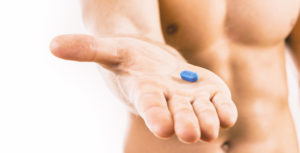
Top Ten Articles on Prep
Is Truvada, the Pill to Prevent H.I.V., 99 Percent Effective? Don’t Be So Sure
United Apologizes, Reverses Truvada Policy After HIV Activists Push Back
8 things you didn’t know about Truvada
FDA Approves First Generic Version of Gilead’s HIV Drug Truvada
Deciding On Truvada: Who Should Take HIV Prevention Pill?
In new study, 100 percent of participants taking HIV prevention pill Truvada remained infection-free
Truvada For HIV Prevention Proves Highly Effective
HIV pill Truvada shows more promise against infection
Why Aren’t HIV Prevention Pills Going to the People Who Need Them?
PrEP is Not Magic and Treating it That Way is Undermining its Incredible Power
Top 10 Medical Websites And What They Have Say About PrEP
History of PrEP/Truvada
Currently, there are a host of HIV treatment drugs. There are inhibitors that prevent the virus from finding a host cell or a particular protein to bind to. Others are antagonists that prevent the further spread of the virus. These drugs are used in various combinations for the treatment of those who are HIV-positive, but always after a person had become infected.
In 1997, Gilead Sciences began testing on the inhibitor tenofovir. It was approved as an HIV treatment by the FDA in 2001. Another antiviral drug, emtricitabine (brand name Emtriva®), was FDA-approved in 2003. These two drugs were combined into a fixed-dose pill to treat HIV that the FDA approved under the brand name Truvada® in 2004.
Further research indicated that Truvada could also be used as to prevent an HIV infection, not just as a treatment. After clinical trials were completed, Truvada PrEP (Pre-Exposure Prophylaxis) was approved by the FDA in 2012. The approval was a controversial one, with some medical professionals and community leaders believing it would provide a false sense of security that would cause users to abandon safe sex practices.


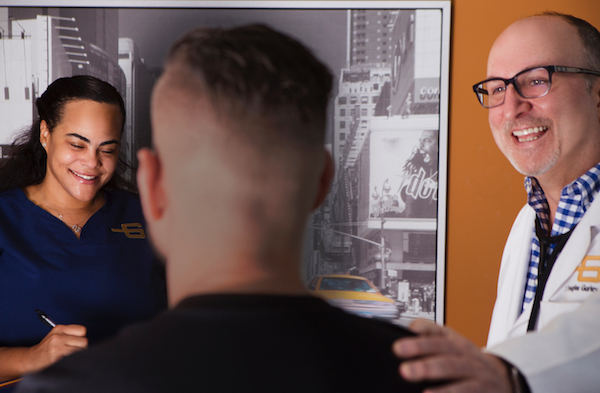 Get Care From People Who Care About You
Get Care From People Who Care About You



